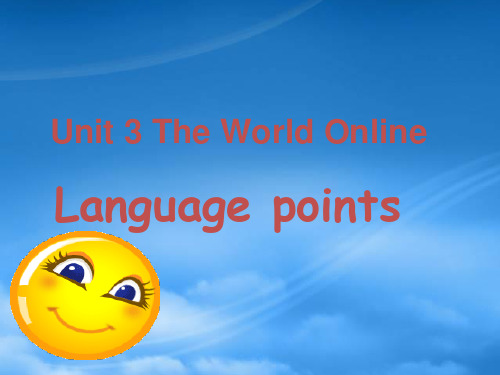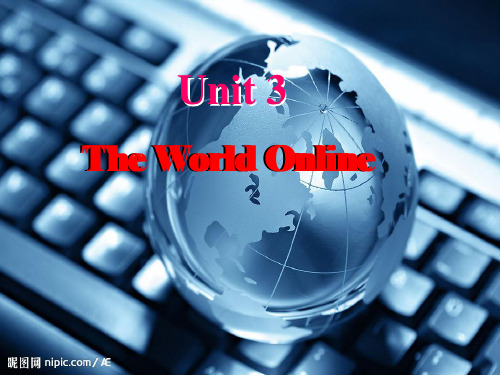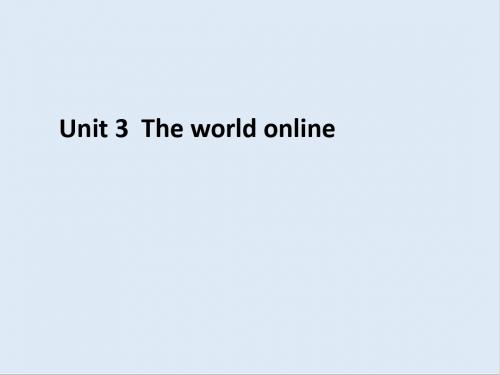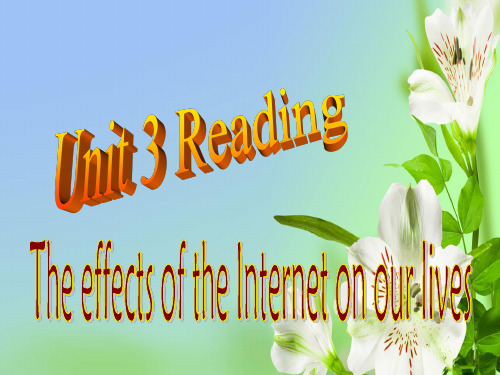江苏高中英语译林牛津版M7U3 The world on line Book 7_U3_Grammar and usage
- 格式:ppt
- 大小:875.00 KB
- 文档页数:27



Unit 3 The world onlineWelcome to the unitTeaching aims:1. After learning this lesson, the students will be able to know more about the Internet, and talk about the Internet and its uses by making a debate on the effects of the Internet on our lives;2. After learning this lesson, the students will develop speaking and discussing skills by talking aboutthe four pictures and sharing ideas in a group;3. The students will have a fluent talk on that the Internet connects people all over the world and thatthe Internet has both positive and negative aspects.Teaching procedures:Step 1 L ead-in (PPT5-9)1. Talk about the computer.2. Learn about “c omputer terms”.(1) Which programme would you like to watch tonight?→A program is something that we use to control or operate a computer.(2) The music from the keyboard sounds like music from a real piano.→A keyboard is a set of keys on a computer that help you operate the computer.(3) I hate to clean windows.→Windows is a kind of computer program developed by Microsoft.(4) Memory is something you may start to lose with age.→Memory is a space in the hard drive of a computer to store information.(5) Julie wants to have a pet mouse.→Mouse is what you control with your hand to move the cursor on the computer screen.Step 2Brainstorming (PPT10-12)1. Do you know how people kept in touch with each other in the past?(People used letters, postcards, telegraphs, faxes and telephones to communicate before the invention of the Internet. )2. Then how people keep in touch with each other now?(With the development of Internet, more and more people are now using computers and the Internet for communication.)3. What are your experiences using the Internet?4. What is the Internet?(The Internet, also called the Net, is a collection of computers connected in a worldwide network.)5. What are the functions of the Internet?(playing computer games, QQ, shopping, music, etc.)Step 3Sharing information (PPT13-20)Discuss the four pictures of the poster “A world of connections”. Encourage students to express their understanding about the different usages of the Internet and have a good imagination of what the Internet brings us in the future.Now work in pairs and have a discussion about each of the pictures.Picture 1can people do on this website?(Search for information on a variety of topics. )do we call this kind of website that provides searching services?(We call it search engine.)3. How can you find information on the Internet using a search engine?(Enter key words)search engines do you know or often use? Which is your favourite search engine?(Google, Baidu.)Picture 2do you think would be the advantages of buying things online?(As online shopkeepers do not have to pay for the rental of a real shop, the products sold online are usually cheaper than those in real shops. It is easy and conveninent to compare a product in several online shops. P aying for things is simple as you just key in the credit card number and confirm the payment online. T he delivery is usually quick and the online shops proivide delivery to your home. A bove all, shopping online saves a lot of time.)do you think would be the disadvantages of online shopping?(Because people can only see pictures of the products online, sometimes you could receive something that was not what you really wanted. T he safety of the payment is not 100 % guraranteed as someone may steal the account numbers or pin numbers of your credit cards registered online. B esides, some people falsely advertise products and then steal customers’ money.)Picture 3you ever tried talking with your parents or friends online?devices do you need if you want to talk with people online?(A computer connected to the Interent, a web-camera, a web-microphone and a web-taliking software…) are the good points and bad points of online talking?(There are many good points. People can save a lot of money instead of paying for long-distance calls. People can k eep in touch with family members or friends wherever you are in the world. People can make new friends in different parts of the world. T here are negative things too. T he quality of the pictures or voices depends on the speed of network transfer. M any peole talk with inline friends without realizing that their pictures could be used by others in illegal ways.)4. Which way of communication do you prefer, talking face to face, talking over the phone, talking online or talking online with a web-camera? Why?Picture 4you tried other online services that are not mentioned here? Which ones?other online services do you think we will need or have in the future?role do you think the Internet will play in the future?you think it is a good idea to ‘live’ on the Internet completely?Step 4 Discussion (PPT21-23)1. What do you think the most important benefit of the Internet is?(Fast speed and easy access are the most important aspects of the Internet.)2. Do you think there are any negative things about the Internet?(There is too much information online that has not been proven to be true. T here are too many exciting computer games, making those who can’t control themselves kill time.)3. In what ways will the Internet improve our lives in the future?(The Internet will free people from the office. E very part of a home can be connected to the Internet, which will make life easier and more comfortable.)Step 5 Debate (PPT24)Step 6Homework (PPT25)1. Write a passage about advantages and disadvantages of using the Internet.2. Preview the reading.Reading (Period one)Teaching aims:After learning this period, the students will be able to:1. understand the argument about the positive and negative effects of the Internet on people’s lives;2. learn about the strategy of “ reading an argument”;3. retell the effects of the Internet and debate about a certain subject.Step 1 Lead-in1. Begin the class by discussion some problems about the Internet… (PPT)(1) What do you usually use the Internet for?(Gather different answers to the questions and show some picturesabout the functions of the Internet: to search for information, to help with study, to play game and download some music and video, for amusement and shopping)(2) What do you think the most important benefit of the Internet is?(It has brought us much convenience; it help us tosave much time, energy as well as mon ey.)(3) Do you think there are any negative things about the Internet?(Give the students a few minutes to discuss with theirclassmates and then ask some to list their opinions)2. From your answers, we can find that some students think it has good effects; some others think it’s bad.That’s what we will mainly learn today.Now please turn to page 34 and let’s learn the passage about the Internet.Step 2 Skimming and scanning for general ideaAllow the students two or three minutes to go through the text quickly to find the answers to the following questions. (PPT)(1) The text is the __________ of the speeches two students gave at an _______________ about the _____________of Internet use.(2) Who are the two debaters?Answers:(1) transcript, inter-school debate, pros and cons(2) Zhu zhenfei, representing the pro-Internet side;Lin Lei, representing the “con”sideStep 3 Reading strategyTell students when we read an argument, there are something we should pay particular attention to. Allow the students about five minutes to read through the reading strategy on page35, and find out the answers to the following two questions. It is suggested that the students work in pairs to compare notes with each other about their answers to the questions. (ppt.)(1) When you read an argument, you must remember that ________________________.(2) How does an argument develop?—The first thing : ____________________________________.―After that: _______________.―In the rest of the argument: _______________.―At the end of the argument: _______________.Answers:(1) a specific view is being given.(2) a statement of what the argument is about;main points;supporting facts;conclusion.Step 4 Careful reading for detailed informationTell students to read the two speeches and see how they were developed. Get them to analyze the structure of each speech and find out information about main points, supporting facts and conclusion. Allow them five minutes to read and then complete the following exercises about the text. (PPT)(1) I. Analyze the structure of the 1st partA specific view: ___________.Para ___: Present the two main pointsPara ___: Supporting facts for Point 1Para ___: Supporting facts for Point 2Para ___: Draw a conclusionII. Fill in the blanks.(2) I. Analyze the structure of the 2nd partA specific view: _________Para 1 : Present the two ___________Para 2 : ________________for Point 1Para 3-4 : Supporting facts for Point 2Para 5: Draw a ___________(1) I. the title; 1, 2-3, 4, 5II. positive, value, 80%, 79%, hobbies, ability, interests, communicate, tool(2) I. the title, main points, Supporting facts, conclusionII. Point 1: uncontrolled information; Point 2: the change in the way people spend their time; Conclusion: It remains important for us either to limit our use of the Internet, or to learn how to handle the problems it has caused.Step 5 Listening and consolidationPlay the tape for students to listen and imitate and ask the students to judge whether the statements below are true or false, and then deal with Part E on Page 37. Check the answer together after that. If some statements are false, ask some students to correct them. (PPT)1. According to the survey, children use the Internet mostly to play games.2. When people are in need of information, the Internet is now the first place that many people turn to.3. In building a friendship, the most important thing is common interests.4. The clinic was opened in Beijing to help people surf the Internet.5. If people spend all their time on the Internet, they will feel separated from the people and the world around them.6. The purpose of the passage is to present the positive effects of the Internet.Answers: FTTFTFStep 6 ExtensionAsk the students to work in pairs and make a dialogue. Supposing one of them is Zhanghua, who spend s much time on the Internet everyday and often make online friends; the other is Liwen, who is worried about the friendship online. And they are debating whether people can find true friendship on the Internet. Give the students an example as follows:Zhang hua: Do you often use the Internet to talk to your friends?Liwen: No, not really. I see my friends at school. People do not tell the truth about themselves on th e Internet, so …Zhanghua: But I like to chat …Liwen: …Get two pairs to act their dialogue out in front of the class.Step 7 Homework1. Finish the exercises on Page 36.2. Write a short argument about whether students should make friends online.Reading (Period Two) ——Language focusTeaching aims:After learning this period, the students will be able to:1. further understand the text;2. understand and use the words, expressions and sentences listed below;3. apply the target language to practical use and in certain contexts.Teaching procedures:Step 1 RetellingRetell the two speeches according to the key words given. (PPT4-6)Suppose you are Zhu Zhenfei or Lin Lei. Retell the text according to the following key words.Pro-Internet sidenegative effectsvalues: look for information; form friendshipa recent survey: 80%...answers to questions; 79%...advance knowledge about hobbiesInternet friendships is based on…common interestscommunicate with the outside worldremains a positive toolCon-Internet sidedrawbacks: uncontrolled information; the change … people spend their timeit is difficult to judge…eBay said 70%... not existaffecting people’s private lifefamilies spend their time apartbecome addicted to…it remains impo rtant either to limit …, or to learn …Step 2 Revision of the new vocabulary in the text.1.Match the words with the correct meanings. (PPT7)2.Fill in the blanks using the new words in the text. (PPT8-9)1)I’m s________ of his ability to finish the task. He seems so careless. One of the greatest d__________ of the Internet is that it sometimes provides false information.2)I suggest living in the countryside, because the house d_________ are too expensive.3)Could you give me the a__________ answer to this question.4)A ________ (私人的) car passed here and rushed the patient to the hospital.5)Chinese arts have won the ___________ (赞赏) of a lot of people in the world.6)This program is meant to help those who are _________ (上瘾) to smoking.7)It suddenly o_______ to me that we went there by bike that day.8)For these reasons, I believe it has p______ effects on our lives instead of n___________ effects.Step 3 Language study1。



Unit 3 The world online Words 教学设计21. Before you get started surfing the web, there are some basic words and terms that are useful to know. (P38) 在你上网搜索之前,了解一些有用的的根本词汇和术语。
getv. (getting, got, got or US gotten) to become or start to be;Is your cold getting any better?Your coffee’s getting cold.After a while you get used to all the noise.[+ to infinitive] How did you get to be a belly dancer?v. [T] 1) to obtain,buy or earn sth.:He’s gone down to the corner shop to get some milk.I think she gets about forty thousand pounds a year.How much did he get for his car (= How much money did he sell it for)?Where did you get your radio from?2) to receive or be given sth.:I got quite a surprise when I saw her with short hair.I got a (telephone) call from Phil last night.What mark did he get in his exam?What did you get for your birthday?If you get a moment (= have time available),could you help me fill in that form?3) to go somewhere and bring back someone or sth.:I must just get the washing in.[+ two objects] Can I get you a drink?4) to take someone or sth. into your possession by force:Have the police got the man who did it yet?5) to prepare a meal:I'll put the kids to bed while you're getting the dinner6) to understand or hear sth.:I didn't get what he said because the music was so loud.I told that joke to Sophia,but she didn't get it.v. [T] INFORMAL 1) to deal with or answer a ringing telephone,knock on the door,etc: Hey,Ty,someone's at the door - would you get it,please?2) to pay for sth.:Put your money away –I’ll get these drinks.[2. This means to look at information without a special goal. (P38) 这是指没有特殊目的的查看信息。